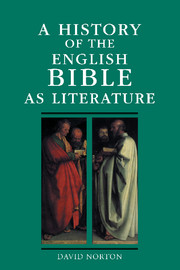Book contents
- Frontmatter
- Contents
- List of plates
- Preface
- List of abbreviations
- 1 Creators of English
- 2 From the Great Bible to the Rheims-Douai Bible: arguments about language
- 3 The King James Bible
- 4 Literary implications of Bible presentation
- 5 The struggle for acceptance
- 6 The Psalter in verse and poetry
- 7 ‘The eloquentest books in the world’
- 8 Writers and the Bible 1: Milton and Bunyan
- 9 The early eighteenth century and the King James Bible
- 10 Mid-century
- 11 The critical rise of the King James Bible
- 12 Writers and the Bible 2: the Romantics
- 13 Literary discussion to mid-Victorian times
- 14 The Revised Version
- 15 ‘The Bible as literature’
- 16 The later reputation of the King James Bible
- 17 The New English Bible
- Bibliography
- General Index
- Biblical Index
12 - Writers and the Bible 2: the Romantics
Published online by Cambridge University Press: 05 June 2012
- Frontmatter
- Contents
- List of plates
- Preface
- List of abbreviations
- 1 Creators of English
- 2 From the Great Bible to the Rheims-Douai Bible: arguments about language
- 3 The King James Bible
- 4 Literary implications of Bible presentation
- 5 The struggle for acceptance
- 6 The Psalter in verse and poetry
- 7 ‘The eloquentest books in the world’
- 8 Writers and the Bible 1: Milton and Bunyan
- 9 The early eighteenth century and the King James Bible
- 10 Mid-century
- 11 The critical rise of the King James Bible
- 12 Writers and the Bible 2: the Romantics
- 13 Literary discussion to mid-Victorian times
- 14 The Revised Version
- 15 ‘The Bible as literature’
- 16 The later reputation of the King James Bible
- 17 The New English Bible
- Bibliography
- General Index
- Biblical Index
Summary
THE FAKER AND THE MADMAN
In 1760 an extraordinary collection of ‘poems’ appeared purporting to be a translation of much the same sort as the KJB. Part of its preface very nearly describes biblical poems and their translation:
They are not set to music nor sung. The versification in the original is simple, and to such as understand the language, very smooth and beautiful. Rhyme is seldom used, but the cadence and the length of the line varied so as to suit the sense. The translation is extremely literal. Even the arrangement of the words in the original has been imitated; to which must be imputed some inversions in the style that otherwise would not have been chosen.
(pp. vi–vii)No one reading this with a knowledge of Lowth and an awareness of the KJB's literalness could fail to see the similarities – significantly, the author of the preface was Hugh Blair, later to publicise Lowth's ideas. This is the kind of poetry he is describing:
My love is a son of the hill. He pursues the flying deer. His grey dogs are panting around him; his bowstring sounds in the wind. Whether by the fount of the rock, or by the stream of the mountain thou liest; when the rushes are nodding with the wind, and the mist is flying over thee, let me approach my love unperceived, and see him from the rock. Lovely I saw thee first by the aged oak; thou wert returning tall from the chase; the fairest among thy friends.
(p.9)Pratt found this ‘not much unlike the scriptural manner of writing’, having ‘an almost scriptural sublimity’ (Sublime and Beautiful, I: 155–6).
- Type
- Chapter
- Information
- A History of the English Bible as Literature , pp. 272 - 298Publisher: Cambridge University PressPrint publication year: 2000



